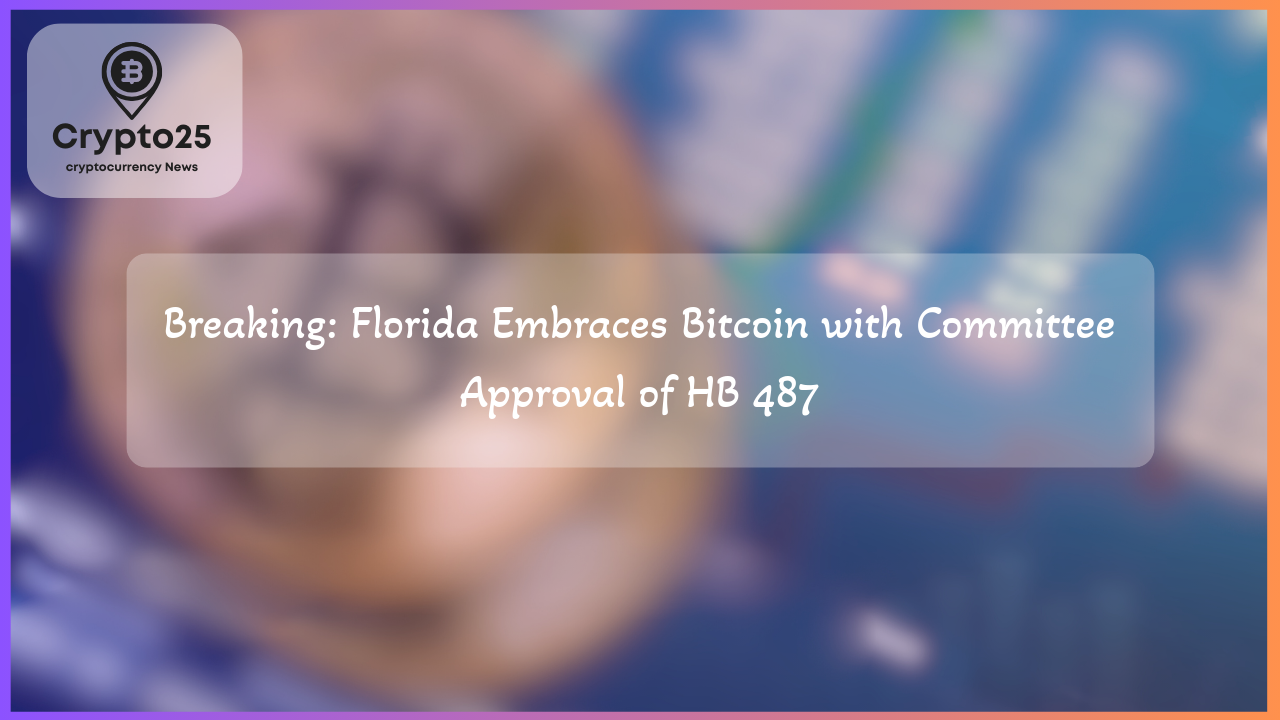
Florida has taken a bold new step in its financial strategy by proposing legislation to adopt Bitcoin (BTC) as a state-held asset. Following the footsteps of Arizona and New Hampshire, the state demonstrates a growing trend among U.S. states exploring cryptocurrencies as potential additions to their sovereign funds. This initiative aligns with the increasing recognition of Bitcoin’s value in public finance and global markets.
## Florida Embraces Bitcoin Through House Bill 487
Florida has initiated the legislative process to incorporate Bitcoin into its financial structure. House Bill 487 (HB 487), passed unanimously by the House Insurance and Banking Subcommittee during its April 10 hearing, sets the framework for this ambitious move. Aptly titled “Investments of Public Funds in Bitcoin,” the bill permits Florida’s Chief Financial Officer and State Board of Administration to allocate up to 10% of public funds, including the General Revenue Fund and Budget Stabilization Fund, into Bitcoin investments.
The bill emphasizes strict adherence to security protocols and compliance standards, ensuring optimal custody of these funds while reducing risks. Strategic applications in the proposal include the ability for the state to loan Bitcoin holdings or integrate them into exchange-traded financial products. However, before this measure becomes law, HB 487 needs to clear several hurdles, passing through three additional committees—the Government Operations Subcommittee, the Ways & Means Committee, and the Commerce Committee—before receiving a full House vote. If successful, it will move to the Senate and then seek approval from the governor.
### A National Trend: U.S. States Adopting Bitcoin Reserves
Florida’s initiative reflects a broader movement among several U.S. states considering Bitcoin as a reserve asset. Arizona is clearly making significant progress in this space. Its Senate Bills 1373 and 1025 focus on digital asset reserves and have advanced through critical legislative stages. Both bills have successfully passed the Senate as well as the House Rules Committee, and they now await a final vote in the full House. If approved, the legislation would only require Governor Katie Hobbs’ signature to enable Arizona to become the first U.S. state with a Bitcoin reserve policy.
At the same time, New Hampshire is advancing its own Bitcoin reserve policy through House Bill 302. Approved by the full House in a narrow 192-179 vote, the bill now faces Senate scrutiny. Unlike Arizona and Florida, New Hampshire’s bill proposes a highly selective investment criterion: only assets with a market capitalization above $500 billion would qualify for inclusion. As of now, Bitcoin remains the sole digital asset meeting this threshold, underscoring its dominance in the cryptocurrency market.
| State | Bill Number | Details |
|---|---|---|
| Florida | HB 487 | Proposes investing 10% of public funds in Bitcoin. |
| Arizona | SB 1373, SB 1025 | Legislation advancing toward adopting Bitcoin reserves. |
| New Hampshire | HB 302 | Allows Bitcoin investments over $500 billion in market cap. |
### The Future of Bitcoin Reserves in State Governance
As Florida progresses with HB 487, its initiative mirrors a shift in financial governance that could influence other states and countries. Bitcoin’s adoption in public funds signifies its growing relevance as an asset, particularly given its decentralized, secure, and inflation-proof characteristic. Should Florida and other states like Arizona and New Hampshire succeed in implementing such policies, their actions could pave the way for further adoption of digital assets within governmental financial strategies.
The implications of such measures extend beyond financial diversification. By embracing Bitcoin as an official reserve asset, states could position themselves as pioneers in digital asset integration, enhancing their fiscal resilience and fostering innovation. Similarly, the ability to leverage BTC holdings through loans or high-return investment tools could contribute to economic growth at a state level.
In a rapidly evolving financial landscape, Florida’s move not only highlights Bitcoin’s potential to reshape public finance but also underscores a growing belief in its utility as a legitimate, long-term investment. As more states join this movement, Bitcoin’s influence in both private and public sectors seems poised to grow exponentially, sparking further adoption and regulatory progress in the global context.
